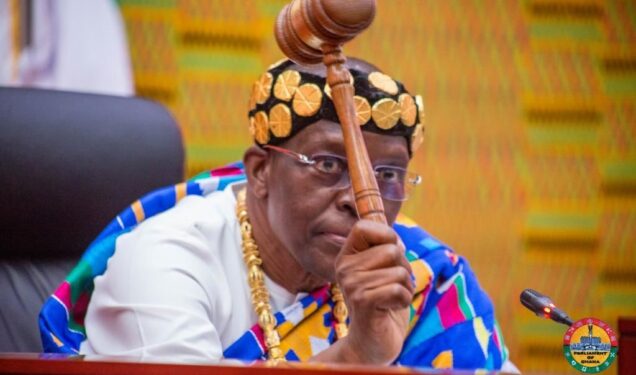Speaker of Parliament Declares Four Parliamentary Seats Vacant, Shifting Balance of Power as NDC Becomes Majority
Ghana’s parliamentary balance has shifted dramatically following a controversial decision by Speaker Alban Bagbin to declare four seats vacant, potentially upending the political landscape just two months before the country’s general election.
The ruling, announced on October 17, has reduced the number of New Patriotic Party (NPP) Members of Parliament to 135, while the opposition National Democratic Congress (NDC) now holds 136 seats, giving them a slight majority in what had previously been a hung parliament.
The decision affects four sitting MPs: Peter Yaw Kwakye Ackah of the NDC, representing Amenfi Central in the Western Region; Andrew Amoako Asiamah, the Independent MP for Fomena in the Ashanti Region; Kojo Asante, the NPP MP for Suhum in the Eastern Region; and Cynthia Morrison, also of the NPP, who represents Agona West.
The ruling follows months of legal and political wrangling within Parliament, with tensions between the two dominant parties at their highest since the election of 2020, which produced a nearly even split between the NPP and the NDC.
At the heart of the Speaker’s decision is Article 97 (1)(g) of Ghana’s 1992 Constitution, which mandates that MPs must vacate their seats if they switch parties or decide to run as independent candidates. In delivering his ruling, the Speaker underscored the constitutional imperative, rejecting earlier arguments that any such declaration should come solely from the affected party, as previously asserted by former Speaker of Parliament, Professor Mike Oquaye.
The ruling has immediately altered the dynamics within the House, where the NPP had relied on Andrew Amoako Asiamah’s support to secure a thin majority. Hon. Asiamah, originally elected as an NPP MP, was expelled from the party in 2020 after declaring his intention to run as an independent candidate, a decision that left him in the unique position of being both an Independent MP and the Second Deputy Speaker of Parliament.
His expulsion, at the time, created significant political friction, and his subsequent return to support the NPP as an independent candidate was a crucial factor in maintaining the party’s majority.
Bagbin’s decision to declare Hon Asiamah’s seat vacant is likely to intensify the already heated political atmosphere, with the general elections looming in December. The NDC has welcomed the ruling, which, for the first time since the 2020 elections, gives them a technical majority in Parliament.
However, the NPP has expressed deep dissatisfaction with the ruling, raising concerns about its timing and potential political motivations.
Meanwhile, legal analysts have noted the wider constitutional implications of the ruling. In an interview on Thursday, Professor Kofi Abotsi, Dean of the University of Professional Studies Law School, emphasised that under Ghanaian constitutional law, any individual, not just a political party, can challenge an MP’s decision to cross party lines.
Prof Abotsi argued that MPs are, first and foremost, representatives of the Constitution, and only secondarily agents of their respective parties. This interpretation may have far-reaching consequences for the way Ghanaian politics is conducted, particularly in a parliamentary system where party allegiance plays a critical role.
The Speaker’s ruling is expected to generate further legal and political battles, with potential by-elections on the horizon to fill the vacant seats. As the country prepares for elections in December, the ruling is likely to become a focal point for both major parties, with the NPP and NDC each hoping to seize the upper hand in the final stretch of the campaign.








